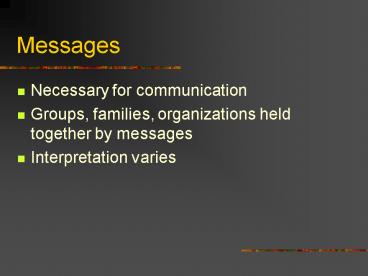Messages PowerPoint PPT Presentation
1 / 22
Title: Messages
1
Messages
- Necessary for communication
- Groups, families, organizations held together by
messages - Interpretation varies
2
We remember messages
- when they are memorable (great! Funny!) or
- irritating, hurtful
- Messages are fundamental to understanding
organizational experience
3
Remember, the definition oforganizational
communication is
- The collective interactive process of generating
interpreting messages - Message overload (information overload)
- Message inadequacy
4
Messages can be
- Non-verbal
- Verbal
- Ostensive messages (actual text which is verbal,
nonverbal) - Internally experienced messages
5
Messages culturally determined
- Edward Hall
- Cultures distinguished by variety and richness of
communication networks - High-context messages
- Low-context messages
6
4 Levels of Messages
- 1, 2) Intentions of senders
- 3) Ostensive messages (what is verbalized)
- 4) Receivers interpretations
7
Messages have multiple meanings
- There are diverse interpretations
- There are gaps in understanding
- In organizations many people are structurally
equivalent - Blatant ambiguity
- Subtle ambiguity
8
Deborah Tannen
- http//www.georgetown.edu/faculty/tannend/index.ht
m - You Just Don't Understand
- That's Not What I Meant!
- Talking Voices
- Talking from 9 to 5
- I Only Say This Because I Love You How the Way
We Talk Can Make or Break Family Relationships
Throughout Our Lives
9
Ambiguity
- Plausible deniability
- Doublespeak
- Political contexts
- National security guise
10
Messages Assume Multiple Forms
- Via technology (email, voicemail)
- Rumours
- Grapevine (informal)
- The Importance of Gossip
- Jokes (www.the humoursource.com) for jokes re
Osama
11
Messages Serve Multiple Functions
- Disguised through language
- Influence messages what strategies are used
here? (shouting, verbal abuse, quiet yet firm
tactics) - Culturally diverse
12
Relationships
- We define ourselves by our relationships
- Personal, familial, professional, secret
- Organizational relationships important and often
hindered/helped by personal relationships outside
the organization
13
Organizational relationships
- More complicated
- Diverse workplace, (multi)culturally and
ethnically and linguistically - Lots of gender weirdnesses
- Changing notions (legal arena) of what is right
wrong e.g., sexual harassment
14
5 characteristics of relationships
- 1. Orientation
- 2. Multiplexity
- Symmetry
- Reciprocity
- Strength
15
Relational Orientation
- Instrumental relationships - (inauthentic,
youre there for the job, prescriptive) - Expressive more emotionally based, holistic
16
Relational Multiplexity
- Links vary interconnect network domains
- Uniplex-within one domain (some work
environments, schools etc) - Multiplexity overlap of roles (work colleagues
become drinking buddies become confidantes).
Crucial for healthy social support networks
17
Multiplex relationships can
- Create some ethical dilemmas conflict of
interest - Towing the line
- Stress emotional exhaustion
- Loss of individuality
- Lack of creativity
18
Relational Symmetry
- Symmetrical or complementary
- Different expectations regarding what message
content is appropriate - Social niceties often a coverup?
- Romance in the workplace
- Sexual harassment (case study Anita Hill)
19
Relational Reciprocity
- Reciprocity- how people share information and
resources, disclose personal information and
opinions - How people help each other
- Physical Networks
- Virtual networks virtual communities, support
groups (health etc)
20
Relational Strength
- Strong (highly inter-networked) or weak
- Intimate or distant
21
Relational Roles
- We all have different roles mother, wife,
professor, friend, colleague, sister, daughter,
aunt, granddaughter - Roles related to social position in society
- Role expectations enacted roles
- Role ambiguity
22
Next
- Hierarchy
- Notions and issues of power
- Participation
- Trends in organizational communication

